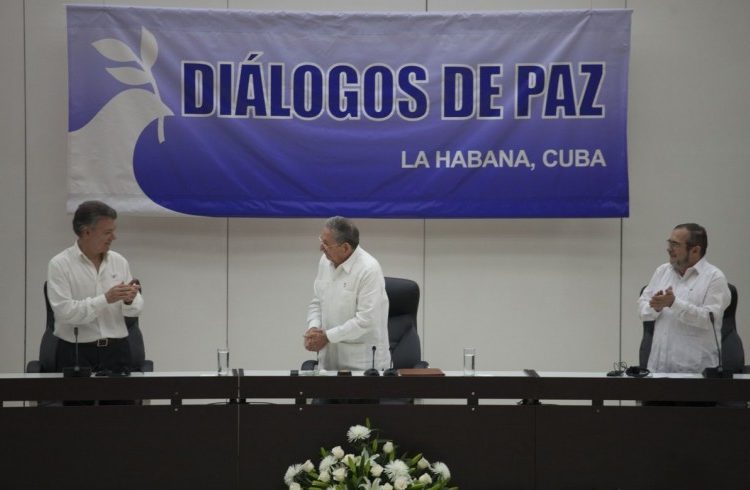On the stroke of midday this Thursday, 23 June, all political eyes in Latin America fixed upon a protocol room in Havana with a very unceremonious name: The Little Lake. For over three years the negotiators for the guerrilla Armed Revolutionary Forces of Colombia (FARC-EP) and the Colombian government have paved, step by step, the way towards the end of the longest running conflict in the region in this room. Once more, the site becomes a stage for the cameras.
Seven presidents from the region, the general secretary of the United Nations and that of its General Assembly, European and American dignitaries. They, in addition to the leader of the FARC, congress people and invited guest from Colombia are the witnesses of this event. The signing of the most important point of the peace agreement between the guerrilla movement and the government has finally been achieved…..although this is still not the end of the negotiations.
But at least the weapons will be silenced from today. The point that covers the bilateral ceasefire, the definitive laying down of arms by the guerrillas and the security guarantees for their reincorporation into civilian life, is agreed upon. The signed document (point #3 on the negotiation table) describes the conditions upon which over 400 unarmed experts, sent by the UN, will verify the definitive bilateral ceasefire of the combatants. 22 zones will be established and eight campsites where guerrilla troops will be housed (located in over 80 fronts throughout the territory of Colombia). Moreover, a schedule for the hand-over of weapons and the security measures to protect the demobilised FARC combatants from possible actions against them from paramilitaries and criminal gangs.
Each point, apart from the disarmament, will begin to come into effect when the definitive peace agreement is signed. After today’s act that agreement is now 90 percent complete, according to various analysts. The disarmament will begin when the Colombians have countersigned the peace agreements in a plebiscite that will be called by the president, Juan Manuel Santos. The plebiscite will be called when the general agreement is signed and the Constitutional Court has pronounced. However, the Court has still not pronounced anything regarding the countersignature.
All this presupposes that there are less than two months left until the agreement is finished, a further two for the ballot boxes to chart the agreement’s acceptance and a number of months to complete the disarmament and the demobilisation. The deadline that was imposed today was 180 days, six months.
The FARC, which today officially confirmed its intention to cease guerrilla activities in order to gradually become a political movement, does not acknowledge defeat. Its representatives are, in this whole panorama, the most cautious, the least euphoric. They have coined the phrase that best describes what has happened today: #TheLastDayOfTheWar (#ElÚltimoDíaDeLaGuerra), but they warn that the peace process has still not been finalised. ‘There’s no icing on the cake’ says Timochenko, the main leader of the insurgents’ says on his Twitter profile.
‘We got to the conversation table convinced of the need for peace, interpreting the desires of the majority, neither the victors, nor of the vanquished’ – Timoleón Jiménez (@Timochenko_FARC) 22 June 2016
‘Of course at the FARC we want to go into politics! That’s our whole reason for our existence!, Timochenko insists in his speech, in which he confirms that the FARC will hand over their weapons and just want guarantees for the legal and equal exercising of proselytising activities.
President Santos is gathering grist for his mill. He has put everything into his efforts to achieve peace in his second term. He has the double pressure of negotiating the end of the conflict with an armed group, thousands of members strong at the same time a significant sector of Colombian society (led by the ex-president Álvaro Uribe) is resistant to a treaty that includes pardon and amnesty for the majority of the guerrillas.
‘The peace process is irreversible’ says the Cuban host, Raúl Castro, who promises to maintain the Caribbean country’s participation until the final agreement, ‘with modesty, discretion and deep respect for both sides’.
Over 26,000 dead, 45,000 disappeared and 6.9 million people displaced from their homes…this is the most visible winnings of almost six decades of conflict. But the very worst damage is in the soul of the Colombian people, too exposed to problems solved with weapons, too accustomed to killing the other, tired to the bone of so much pointless warring.










